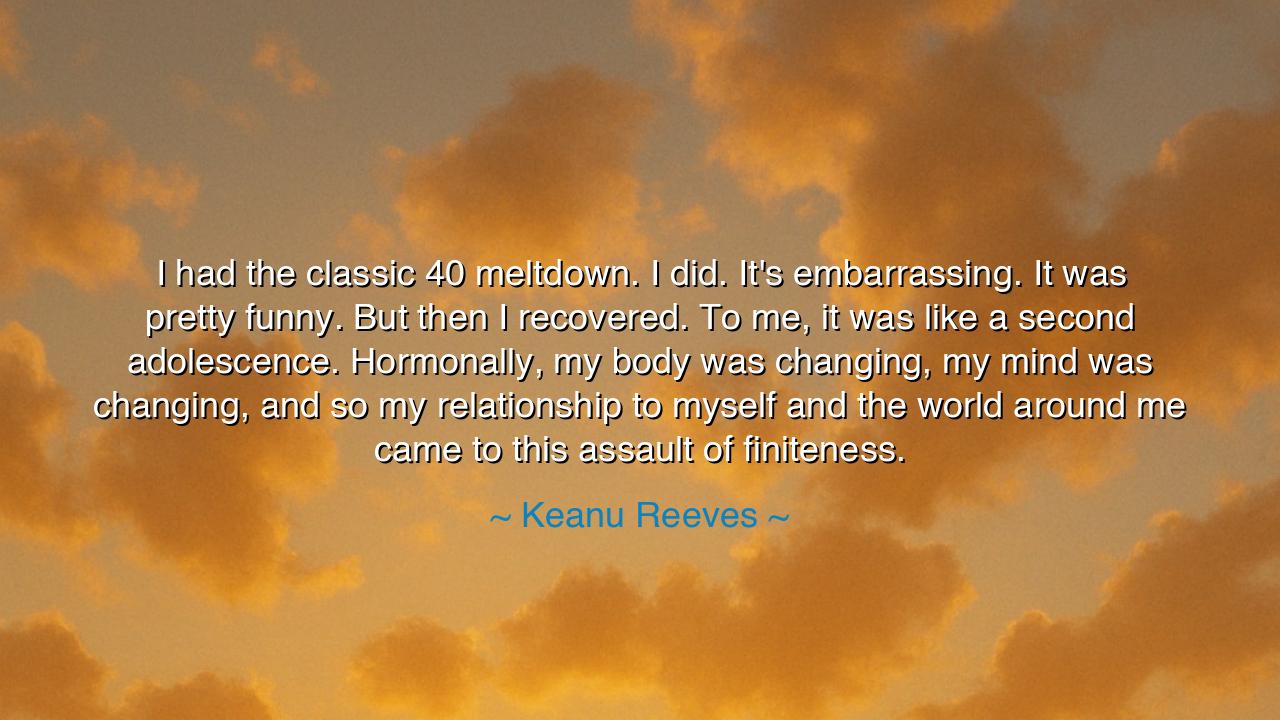
I had the classic 40 meltdown. I did. It's embarrassing. It was
I had the classic 40 meltdown. I did. It's embarrassing. It was pretty funny. But then I recovered. To me, it was like a second adolescence. Hormonally, my body was changing, my mind was changing, and so my relationship to myself and the world around me came to this assault of finiteness.






The quiet philosopher of modern cinema, Keanu Reeves, once reflected: “I had the classic 40 meltdown. I did. It’s embarrassing. It was pretty funny. But then I recovered. To me, it was like a second adolescence. Hormonally, my body was changing, my mind was changing, and so my relationship to myself and the world around me came to this assault of finiteness.” In these words, spoken with humility and humor, there lies a deep meditation on mortality, identity, and the ever-evolving nature of the human spirit. His confession, though light in tone, carries the gravity of an eternal truth — that even as the body ages, the soul continues to search, question, and renew itself.
When Reeves speaks of a “meltdown,” he does not speak of failure but of transformation. The middle of life, that fabled turning point, is not the decline of youth but the awakening of awareness. It is the moment when one’s illusions — of invincibility, of endless time — begin to fall away, revealing the fragility that defines all human existence. This “assault of finiteness,” as he calls it, is both painful and sacred. It is the reminder that our days are numbered, but that their meaning is ours to shape. In this way, his words echo the teachings of the ancients, who understood that to face mortality is not to despair, but to awaken to life more fully.
The ancients called such moments metanoia — the turning of the soul. The philosopher Plato spoke of the soul’s journey as a spiral, forever circling closer to truth through cycles of learning and forgetting. Reeves’s “second adolescence” reflects this same idea. In youth, we awaken to the outer world — to desire, ambition, and discovery. But in middle age, we awaken to the inner world — to meaning, impermanence, and humility. The first adolescence teaches us how to live; the second teaches us how to be. It is not a time of loss, but of renewal, where one must shed the skin of certainty and stand again in the trembling wonder of not knowing.
There is a story told of Marcus Aurelius, the Roman emperor and Stoic philosopher. In his forties, weary from war and grief, he began writing the meditations that would one day immortalize his name. He looked upon the vast empire he ruled and realized its smallness before time’s horizon. “Do not act as if you were going to live ten thousand years,” he wrote to himself. “Death hangs over you. While you live, while it is in your power, be good.” Like Reeves, Marcus met his own “meltdown” not with despair, but with clarity. He too faced the assault of finiteness, and from it, he drew peace. For to see one’s limits is to finally grasp what is truly limitless — compassion, integrity, and the quiet strength of the soul.
Reeves’s tone, however, is not solemn but funny, even gentle. He finds in his struggle a kind of comedy — the absurdity of being human, of thinking we can master time, only to be humbled by it. In his laughter, there is wisdom. The ancients believed that laughter was sacred — that it disarmed fear and restored balance to the heart. When he says, “It was embarrassing. It was pretty funny,” he reveals the power of humility: to face one’s unraveling with a smile. For in the laughter born of honesty, there is healing. It is the laughter of one who has seen both darkness and dawn, and learned that both are part of the same sky.
The phrase “assault of finiteness” may sound grim, yet it is a blessing in disguise. To be confronted by our limits is to be called back to life’s essence — to the tenderness of the moment, to the beauty of imperfection, to the urgency of love. Those who live as though time is infinite grow careless; those who accept their mortality grow wise. Reeves’s words remind us that awareness of our end does not diminish us; it enlarges us. It allows us to live deliberately, to savor the fleeting, to forgive more easily, and to let go of the trivial burdens that no longer serve the heart.
The lesson, then, is simple yet profound: do not fear your transformations, for they are the milestones of your becoming. When life confronts you with change — when your mind shifts, your body falters, or your certainties dissolve — see it not as a crisis, but as your second adolescence. Approach it with curiosity, even humor. Let the old self fall away so that a truer one may rise. For each “meltdown” is an initiation — a baptism by the fire of impermanence — and those who endure it with courage will emerge gentler, wiser, and freer.
So, my child, when you feel the assault of finiteness, do not shrink. Stand in it. Laugh if you can. Weep if you must. For what you are facing is not the end, but the beginning of deeper seeing. As Keanu Reeves teaches through his humility, to be human is to fall and rise again — to meet every season of life not with fear, but with reverence. The body may change, the world may shift, but the soul, ever ancient and ever new, learns to dance again — lighter this time, knowing at last that beauty lies not in perfection, but in the courage to embrace the passing of time.






AAdministratorAdministrator
Welcome, honored guests. Please leave a comment, we will respond soon